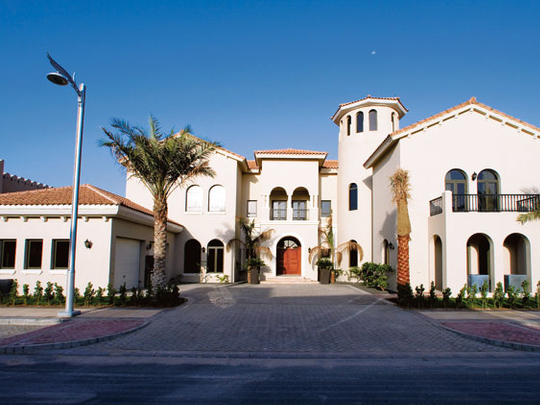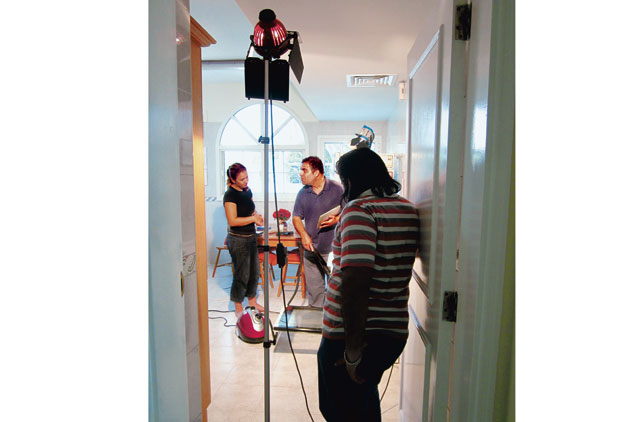
Whether you have bought your own home, or are renting even the smallest apartment, living in the UAE is not always cheap. There are utility bills to pay and there is always something that needs doing around the home. So imagine if, for once, your property could actually bring in heaps of money — in fact, up to Dh10,000 per day!
While this may sound too good to be true it is not as far-fetched as it sounds. The fact is that television companies around the UAE are prepared to pay handsomely for a place in which they can film TV commercials, and even high budget movies.
Get your home listed
Albert Gayo, head booker for Diva Modelling and Events, who arranges such television shoots, explains, "Payments depend a lot on each project but one can expect Dh1,000 to Dh10,000 per day depending on what the shoot is for. Of course, larger houses get the higher end of the fee, but as long as the art director is happy with the looks of the property he will pay what is necessary."
This means that, no matter what type of property you have, whether a mansion or more humble abode, there is the possibility of renting it out.
"We are always on the lookout for properties like houses, flats, penthouses, villas, gardens and others and there is always a demand for new locations and places," admits Gayo. "We accept almost any property because our clients look for variations, so we do not refuse anyone who is interested in getting into the business of having their property listed."
At Diva they already have 300 homes on their books, but anyone wishing to join the list can contact the agency and they will arrange it. "It is very easy," Gayo says, "You just have to contact us, then we will visit the property, take photos of the different rooms, nooks and crannies of the house and get your details and voila — you're listed."
So how can a homeowner ensure that their property is chosen from the hundreds that are available, for these lucrative opportunities? "It will depend a lot on the booker [in the agency] and the client," explains Gayo.
"The booker is the first one to send photos to clients. They are then shortlisted and eventually one is approved by the client." Having good photos of the property is also beneficial because it is the first thing the client sees, so good photos and a good relationship with the booker will be an advantage. If your property is chosen, you are informed by the agency. "Once the television company chooses a property, the booker calls you and sets an appointment to visit it, inspect the surroundings and confirm the places to shoot. Then you all agree on the price and date of the shoot, you sign a booking form and that is it! The booker will also inform you of all the details — from the arrival of the crew, the expected number of days or hours, to the placement of things. You normally get notified at least one week in advance, but in some extreme cases two days before the shoot."
As for the productions that can take place, this could be for any imaginable type of product, and Gayo suggests, "So far we have booked lots of properties for different types of work from TV commercials to photoshoots to product launching. Some of our clients for whom we have booked properties are L'Oreal, Pizza Hut, Gold Council, Indian film productions, Sharjah TV and others.
Jeroen van der Geer rents his lavish signature villa on Palm Jumeirah out regularly. "We rent our house out once or twice a month," he says. "At the moment they are filming a Ferrero Rocher advert. We mainly rent the house out for TV commercials, and sometimes magazines."
The pitfalls
However, while Jeroen van der Geer receives Dh10,000 for the use of his beguiling property, renting your home out is not a decision to be taken lightly. "You do not have a lot of say when you give the house to someone," he admits. "There are cables going through your home, which are five centimetres thick. It is like a Hollywood movie when they are filming, with lots of trucks parked on the street. Sometimes you get up to 30 people walking around your house all day."
David Martin also rented his house out to a television company, which was for the filming of a home cleaning commercial. "It was great fun, seeing all the TV cameras filming inside our house. Although filming went relatively smoothly and there were no major issues, I was quite concerned when one of the film crews' tall lights hit a brand new chandelier I had bought! Luckily it was not damaged, but it made me realise that you are taking a bit of a chance and things could have gone terribly wrong," he says.
While you are taking a risk by allowing the film crew free reign throughout your much treasured residence, Gayo says, "So far we have been providing location properties for different shoots for the last eight years and we never had any experience of major damage. Typical damage will be paint chips, furniture scratches or floor scratches. What we do is actually get a security deposit from our clients. If and when, following the shoot, there is any damage, we make sure the home is back to its original look and pay for any damages incurred from the security deposit."
Although this is something to take into consideration, homeowners also need to think about the potential lack of privacy in their home too. Gayo suggests, "Before signing up make sure that you are not intimidated by people invading your privacy, always expect the unexpected. There will be crew, lighting equipment, etc that is coming up and down your house for the duration of shoot, so you have to be ready for this."
The duration of a shoot is normally a day, but residents do have to bear in mind that filming could stretch out longer and, according to Gayo, television commercials can sometimes take four to five days.
The benefits
Of course, the longer the shooting takes, the more money is involved, so while it may indeed be a little inconvenient, the rewards are definitely worth it.
"We only had one day's filming at our home and received Dh2,500. We actually dictated the sum as it was the first time we had ever done anything like this and felt that this was a fair price," suggests Martin. "To be honest, it was something that was unexpected so to have that money felt like a windfall. We had only recently moved into our new home and having this extra money meant that we could put it towards a painting that we really wanted."
For those who are fortunate enough to have had their home chosen for a shoot the payment comes swiftly after filming.
Gayo of Diva Modelling and Events says, "Right after the shoot we check on any damage, bring everything back to its original position and we then send an invoice to our client and as soon as the client pays, which is a minimum of one week and a maximum of 30 days, we issue the cheque."
With the money received, most people who rent their homes out to television companies find the experience has all been worthwhile, even if their house has been invaded for a few days. However, for many it is not only the financial reward that provides satisfaction. "It is not only about the money. Yes, with the money we can have a weekend away, but I am also proud of my house and it is good to see it on television," Van der Geer concludes.
How to ensure that your home is in demand.
Some properties are more popular than others and Albert Gayo, head booker for Diva Modelling and Events, says, "One of the most popular homes used is a signature villa in Palm Jumeirah because of its size and its modern look. The villa has a beach at the back and from the living room you can actually have a sea view. Also, the interior is white and silver, so it looks really clean and modern."
But, even if your home doesn't have the perfect location or that contemporary feel, there are things you can do to increase your property's chance of being chosen for filming. This is what Gayo advises:
- Have your property listed with as many agencies as possible.
- Have a good relationship with your booker who will then represent your property at its best.
- Make sure you get good photos of the property, showing the best angles and places in the house.
- Make a portfolio of the house and collect all previous photos or television commercials that have been done in the property.
- Make your rate reasonable but also competitive in the market price.
Think carefully
Before you hastily list your property there are some things to consider.
- If you have lots of precious ornaments, and you are particularly house proud, then this may not be for you. Do not forget that you will have people walking in and out, there will be cables everywhere, and there is the possibility that something could get smashed. If you do decide to rent your home out do ensure that any precious heirlooms are hidden safely away.
- During filming, furniture will be moved and there will be major disruption around the house. Chances are that you are not going to be able to carry on with your usual routine while there is filming going on. Be aware that the crew will have to take over your home and this is what you are being paid for.
- If the production team is not doing any major changes like taking out a door, changing a cupboard or anything similar, you do not need any permission from your landlord if you are a tenant. However, if the film crew do need to remove anything for the shoot you will be required to inform the landlord.
How to put your home on reel
Some properties are more popular than others, Albert Gayo, head booker for Diva Modelling and Events, says, "One of the most popular homes used is a signature villa in Palm Jumeirah because of its size and its modern look. The villa has a beach at the back and from the living room you have a sea view. Also, the interior is white and silver, so it looks really clean and modern."
But, even if your home doesn't have the perfect location or that contemporary feel, there are things you can do to increase its chance of being chosen for filming. This is what Gayo advises:
- Have your property listed with as many agencies as possible.
- Have a good relationship with your booker who will then represent your property at its best.
- Make sure you get good photos of the property, showing the best angles and places in the house.
- Make a portfolio of the house and collect previous photos or television commercials that filmed it
- Make your home rate reasonable but also competitive in the market price.
Things to consider
- If you have precious ornaments, and you are particularly house-proud, then this may not be for you. Do not forget that you will have people walking in and out, cables everywhere, and there is always a possibility that something could get smashed. If you do decide to rent your home out, do ensure that any precious heirlooms are hidden safely away.
- During filming, furniture will be moved and there will be major disruption around the house. Chances are that your usual routine could be disrupted while there is filming going on. Be aware that the crew will have to take over your home and this is what you are being paid for.
- If the production team is not doing any major changes like taking out a door, changing a cupboard or anything similar, you do not need permission from your landlord, if you are a tenant. However, for major changes you will be required to inform the landlord.









